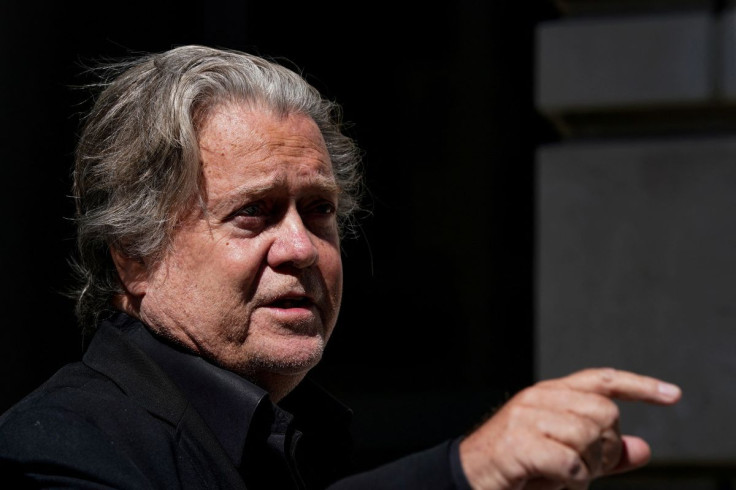U.S. Judge Mulls Delay Of Trump Ex-aide Bannon's Trial Over Evidence Dispute

A federal judge said on Tuesday he will consider delaying the criminal trial of Steve Bannon, a prominent former presidential adviser to Donald Trump, due to a dispute over the scope of the defense to be presented for why Bannon defied a subpoena from lawmakers investigating last year's attack on the U.S. Capitol.
Bannon, 68, is facing two misdemeanor counts of obstruction of Congress after he declined last year to provide testimony or documents to the Democratic-led House of Representatives select committee.
The court had been expected to finalize selecting 12 jurors and two alternates from a pool of 22 people on Tuesday, with opening statements from the prosecution and defense following. That process was delayed as U.S. District Judge Carl Nichols dealt with a dispute between the two sides over what evidence can be presented by the defense in the case.
The judge denied a motion by Bannon's lawyers to delay the start of the trial by a month, but said he would entertain the possibility of a shorter delay - perhaps a couple of days - and ordered the parties to hash out the issues over a lunch break.
Nichols had previously ruled that Bannon could not claim he failed to comply with the subpoena because he believed his documents and testimony were protected by a legal doctrine called executive privilege that can keep certain presidential communications confidential.
The judge also previously barred Bannon from telling jurors that he relied upon advice from his lawyer, who told him there were valid legal reasons he could fail to respond to the subpoena.
Nichols left open the door last week for Bannon to offer a defense that he believed the subpoena deadlines were flexible and subject to negotiation. Bannon reversed course this month and said he wanted to testify before a public committee hearing, nearly 10 months after defying the subpoena.
There has been no indication of any plan to have him do so, as the committee likely would want him to first testify in closed sessions in order to cover a wide range of matters. Trump told Bannon he was waiving any executive privilege claim.
Bannon's lawyers on Tuesday said that they need to be able to explain to the jury that Bannon believed executive privilege applied when he defied the committee.
As the potential jurors waited outside the courtroom, Bannon's attorneys and prosecutors argued over whether communications between the committee and Bannon's attorneys could be introduced as evidence, and if so, whether they needed to be redacted because the documents make reference to executive privilege.
"I am concerned about making redactions on the fly," said Evan Corcoran, one of Bannon's defense attorneys.
Trump's supporters stormed the Capitol in a failed effort to block formal congressional certification of his 2020 election loss to Democrat Joe Biden.
As a top adviser to the Republican Trump's 2016 presidential campaign who later served as White House chief strategist, Bannon helped articulate the "America First" right-wing populism and fierce opposition to immigration that helped define Trump's presidency.
Trump last year issued a pardon to Bannon on separate criminal charges of defrauding donors to a private fund-raising effort to boost the former president's project to build a wall along the U.S.-Mexican border.
© Copyright Thomson Reuters {{Year}}. All rights reserved.





















